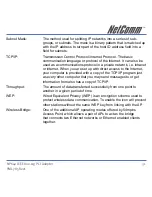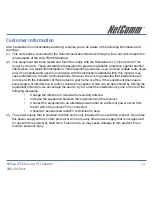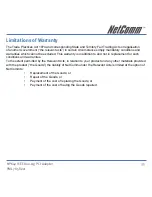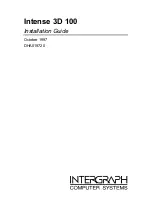
26
NP642 IEEE 802.11g PCI Adapter
YML785 Rev1
Bandwidth:
The transmission capacity of a device, which is calculated by
how much data the device can transmit in a fixed amount of time
expressed in bits per second (bps).
Beacon:
A beacon is a packet broadcast by the Access Point to keep the
network synchronized. Included in a beacon are information such
as wireless LAN service area, the AP address, the Broadcast
destination addresses, time stamp, Delivery Traffic Indicator Maps,
and the Traffic Indicator Message (TIM).
Bit:
A binary digit, which is either -0 or -1 for value, is the smallest unit
for data.
Bridge:
An internetworking function that incorporates the lowest 2 layers of
the OSI network protocol model.
Browser:
An application program that enables one to read the content and
interact in the World Wide Web or Intranet.
BSS:
BSS stands for “Basic Service Set”. It is an Access Point and all the
LAN PCs that associated with it.
Channel:
The bandwidth which wireless Radio operates is divided into
several segments, which we call them “Channels”. AP and the client
stations that it associated work in one of the channels.
CSMA/CA:
In local area networking, this is the CSMA technique that combines
slotted time -division multiplexing with carrier sense multiple access/
collision detection (CSMA/CD) to avoid having collisions occur a
second time. This works best if the time allocated is short compared
to packet length and if the number of situations is small.











































